Auschwitz and the attack in Berlin
Where do I even begin with these topics?
I’ll start out by extending a note of caution when looking at the pictures I’ve posted. I do not want to traumatize or upset anyone so please look on with caution. Also, I would really appreciate some comments and discussion on this post because I am feeling quite overwhelmed (as Social Workers often do) with the things I’ve been learning, seeing and hearing since I’ve started this “International Social Work Journey abroad.”
I still haven’t started my internship but because of my being specifically in Germany and the recent events that have taken place here, I have already learned and conversed a lot about the hot topics that pertain specifically to this country: the Holocaust and the migrant crisis.
Visiting Auschwitz has always been something I’ve wanted to experience. Because of my newly-adopted human rights and trauma-informed Social Work perspectives, I figured now was a better time than ever to do so. I would think that to most people, visiting Auschwitz, in the bitter-cold winter, right before Christmas, would be extremely depressing but for me, it ended up being the perfect decision. There were beautiful Christmas decorations everywhere in Katowice (the Polish city where my mother and I decided to stay for two days) but once the tour company picked us up and drove us closer to the site, the 28 degree, wet and foggy weather became more apparent to us. We decided to take the tour on Tuesday, December 20th.
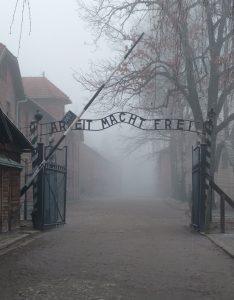
Entrance to Auschwitz Concentration Camp
The very first thing we saw was the same entrance to the camp where hundreds of thousands of innocent victims of the Holocaust walked through. The famous Arbeit Macht Frei (Work Makes you Free) sign on the entrance gates to the camp was described by our tour guide as a “cynical forewarning” to those who entered unwillingly. The heavy fog directly behind it and throughout the entire camp set the tone for the rest of the tour. There were so many new and under-discussed things that I had learned, saw and felt and it would take a very long time for me to share everything here, but the pictures I’ve decided to include are images of some of the things that really hit me the most. Throughout the entire experience, one of the reoccurring questions I kept asking myself was, “How could human beings stand to participate in and encourage such acts every single day?” At the end of the tour, our tour guide thanked us for coming and she told us how important it was for this generation to see places like Auschwitz because in her words, “if it happened once, it could surely happen again.”
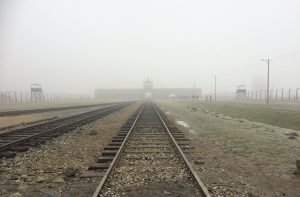
Train entrance to the camp and exact location where prisoners were unloaded from train cars
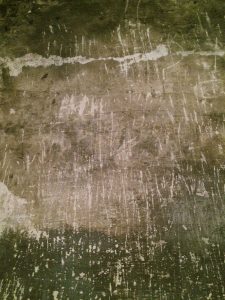
The walls inside one of the gas chambers
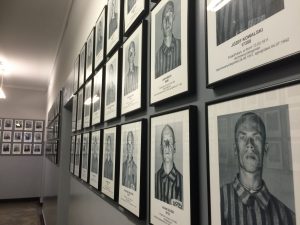
A handful of the faces of prisoners who died in Auschwitz. Below each picture was each individual’s place of origin, their age, the date they arrived in the camp and when they died in the camp. Many of the ones I read died after about a week of entering the camp
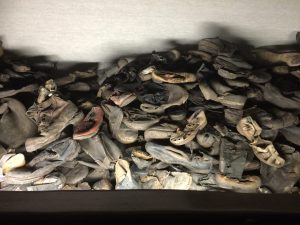
Confiscated shoes of the inmates
When we got back to our hotel after the tour and turned on our TV in the hotel room, the first thing we saw was what happened in Berlin (5 hours northwest of us). It was such an emotional day already and then to hear about the attack in the same day was really upsetting, to say the least. Like many people, I immediately started to question and think, Was this related to ISIS? Was this the doing of newly resettled refugee? (and as hard as it is for me to share this with others, I was being hopeful when I thought,) Maybe it was just a German native so that the spotlight will be taken off of the asylum-seekers and refugees in Germany.. But with the more people I talk to about this and the longer I am here, the more I realize that it doesn’t matter who carries out these acts because what it comes down to is that there is absolutely no correlation between violence and one’s nationality or residence status.
Whenever the opportunity has arisen, I have made it a point to ask German people about their thoughts and perspectives on the Holocaust and the recent migration crisis and to my surprise, all of the responses have been very similar. Overall, there is a message of humility, hope and a highly prioritized value for human life that is expressed, and I find it so refreshing. The final national news broadcasting in Germany for 2016 aired last night and of the many topics discussed in the “year recap” segment, were the several terrorist attacks that occurred in Europe and the migration crisis. However, what stood out to me the most was how purposeful they were in showing footage and including the stories of individuals affected on both sides, as well as its end on a positive note. I really appreciated and needed this and even though there are still many unknowns that lie ahead, I choose, like the people of Germany, to focus on the positive things and on remaining hopeful.

Berliners refusing to be divided after the 12/19 Christmas market attack
I have lots more to share about Auschwitz, Poland in general, last week’s attack in Berlin and what I have observed to be the German perspective on these things so I welcome any and all discussion and questions on these things and anything else that may come to your mind! Thank you for reading and I hope this has been interesting in some way for you! Have a happy, safe and positive New Year!
Your words and pictures of Auschwitz are sobering reminders of the past’s missteps and, hopefully, a dutiful reminder for all of us to never let it happen again. Thanks for sharing your thoughts and best of luck for your internship with German Red Cross. Stay warm and safe!
Thanks for commenting Dr. Kim! I completely agree and that is why I think everyone should visit Auschwitz at least once in their lifetime. Thank you for the kind words and I hope you have a great start to the spring semester!
Cherice, thanks for writing this.
Your question, “How can human beings stand to participate…,” is one that can come up in social work practice, unfortunately. How can the human spirit survive the Holocaust? Social work helps to address genocide, the aftermath of acts of terrorism, and forced migration. And you are confronting them all even before your internship starts…
I hope the motto “Never again!” regarding the Holocaust is as well-known and as ubiquitous as is the “cynical forewarning” of “Arbeit Macht Frei (Work Makes you Free).” The picture of the Berliners standing with peaceful signs gives me hope that refugees will not become scapegoats following the Christmas Market attack.
This time you have spent traveling, reflecting and absorbing the culture (and polishing your already adequate German) will undoubtedly help once you start work your with refugees at your Red Cross internship.
You are most welcome Pat. I’m really thankful that I have a safe place for me to express how I feel! Although I was feeling overwhelmed and upset when writing this, I too, think that reflecting on these topics and the discussions I’ve had with others about them will definitely prepare me for my upcoming tasks. Overall, I really look forward to learning more and applying these things in the near future!